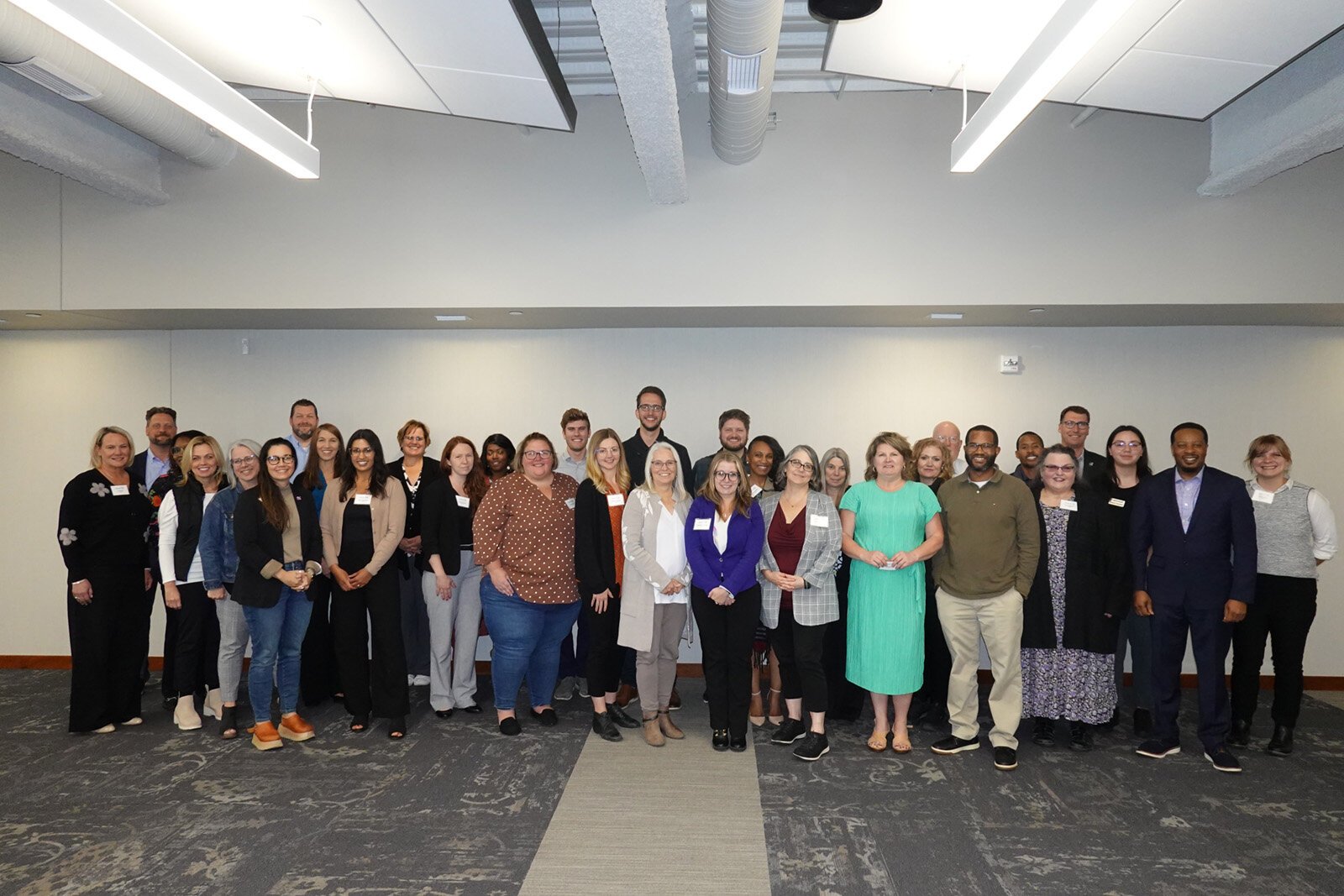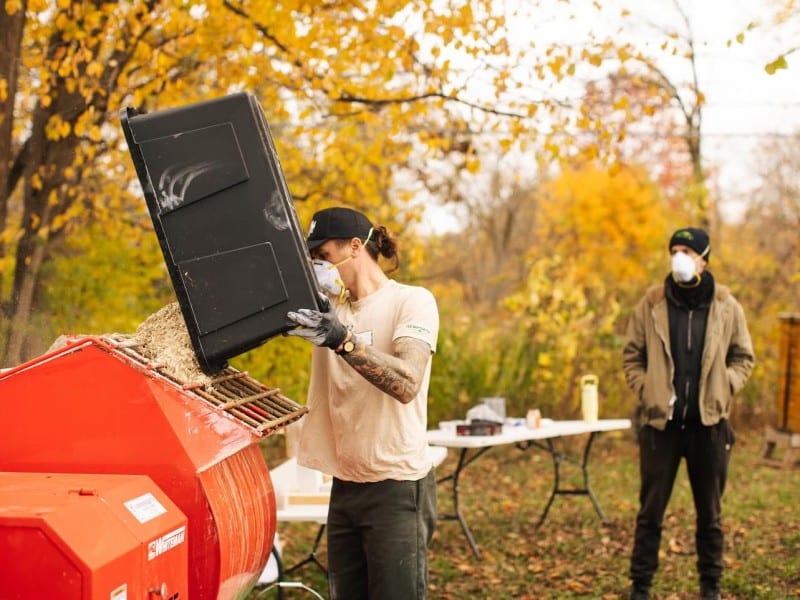
The Region O Regional Housing Partnership brings together numerous stakeholders and experts from across Detroit to develop a comprehensive plan to tackle housing challenges.
This story is part of a series that highlights the challenges and solutions around housing in Detroit and is made possible through underwriting support from the Detroit (Region O) Regional Housing Partnership and the McGregor Fund.
Recent years have brought plenty of positive news for Detroit, from national narratives of urban renewal to the news that the city’s population had grown for the first time since 1957. But at the same time, the city is grappling with a housing crisis that manifests on many levels.
U.S. Census and American Community Survey data compiled by the State of Michigan Housing Data Portal show that homeownership rates in the city fell from 60.9% in 2012 to 55.7% in 2022 among white residents, and from 51.9% to 47.1% in the same time period among Black residents (who represent 77.8% of the city’s population). 26.3% of Detroit renters are cost-burdened, meaning they spend 30-49% of their income on rent, while 33% are severely cost-burdened, meaning they spend 50% or more of their income on rent. Meanwhile, a city report found that 8,537 people experienced homelessness in the city in 2022.
The challenges are daunting, but a new initiative has brought together numerous housing stakeholders and experts from across the city to develop a comprehensive plan to tackle them. That initiative, the Region O Regional Housing Partnership (RHP), is one of 15 partnerships across the state of Michigan, funded by the Michigan State Housing Development Authority (MSHDA) to address local housing challenges in keeping with Michigan’s 2022 Statewide Housing Plan. Community Development Advocates of Detroit (CDAD) and the Local Initiatives Support Corporation of Detroit (LISC) were named the co-leads of Detroit’s RHP in May 2023.
The RHP has engaged representatives of government bodies, philanthropic and nonprofit organizations, private sector financial institutions, academic institutions, and more. LISC Executive Director Rob Lockett says such a comprehensive, cross-sector approach to resolving Detroit housing issues has potential because it’s “never been done before.”
“I think the model itself is unique and interesting,” he says. “It incorporates a lot of moving pieces and a lot of different voices at the table to give that really representative sample of individuals and organizations that ultimately are moving the region forward.”
RHP lead organizations have received $175,000 from the state for a grant term ending in 2025. However, Angela Carlberg, senior director of community development ecosystem building at CDAD, sees the RHP as a way to build relationships and strategy into the long-term future.
“This is a movement, not a moment,” she says. “This is really an opportunity for us to decide not just what we do together, but how we do this work together, and to interrupt current ways of being and doing.”
Housing ecosystem
The Region O RHP has identified, and organized working groups, around four key priorities: strengthening Detroit’s housing ecosystem, improving housing stock, promoting homeownership, and advancing racial justice. Alese Springer, senior program officer for housing at LISC, says stakeholders collectively identified those as “the most prevalent and pressing issues” for the city in their first convening last year. Carlberg says that all four priorities are also “very much rooted in an understanding that we are working to prevent and end homelessness.”
“We wanted to ensure that that was something that was embedded across all of our work,” she says.
To that end, the housing ecosystem working group is focused on making sure developers are well positioned to address housing needs in the city, including those of the unhoused. Eleanor Bradford, systems coordinator for housing resources at the Homeless Action Network of Detroit, and Heidi Reijm, principal community development specialist at the Federal Reserve Bank of Chicago, co-chair the RHP’s housing ecosystem working group. Reijm says the group’s two main goals are increasing the availability of data on housing needs in the city, and supporting housing expansion by increasing the availability and demographic diversity of workers in construction and real estate industries. Reijm and Bradford say they’re bringing together representatives of organizations that compile housing data, including the state of Michigan and Detroit Future City, to ensure broader awareness and usage of their work.
“I wanted to see the bigger picture of what it takes to have housing as a whole for the city of Detroit, particularly for people that are of low income,” Bradford says.
Bradford says she also hopes to streamline existing housing data sources into a more comprehensive resource, and to encourage better dialogue between housing advocates, developers, and financial institutions.
“This has definitely engaged broad partnerships,” she says. “It’s definitely made us now try to create pilot programs within the continuum in Detroit, so that people that are experiencing homelessness don’t have to go to a shelter, know that they can become a homeowner, and that it’s an experience and it’s not a category of who you are.”
Housing stock
The RHP’s housing stock working group is aiming to create a “supergroup” of local housing stakeholders and developers to fill housing needs in the city. That’s according to Krysta Pate, founder and CEO of The Ownership Initiative, who co-chairs the working group with David Alade, co-founder and CEO of Century Partners. Pate says the working group aims to collect data on what tools would be most helpful for small Detroit-based development businesses to create housing, determine what housing types Detroiters are seeking, and create innovative tools to help meet that demand with supply.
Pate notes that the city is dominated by single-family homes. 65% of the city’s residential buildings are single-family, according to the state’s Housing Data Portal. And single-family homes even make up a majority of rental buildings. But Pate says there’s need for greater diversity.
“We really don’t have a large variety between your single-family home and maybe your 20- to 50-unit apartment [building],” she says. “… We have this huge gap of properties that need to be brought back online in the multi-family space.”
Pate notes that she also helps to create tools to help developers rehab existing single-family homes that may not be habitable. She says virtually all single-family homes in Detroit “need some level of renovation,” which has “plagued” the work of fulfilling housing demand in the city. Although a majority of Detroit homes were owner-occupied in 2021 (and again in 2023) for the first time in over a decade, Pate says there’s “certainly more work to do.”
“That’s been something that’s on my list, and a few other folks’ list: how do we create more move-in-ready homes?” she says. “And I’m excited that we’re heading down that path.”
Homeownership
While the housing stock working group works to fulfill demand for multi-family (i.e., rental) housing, the RHP’s homeownership working group will work to ensure that buying a house remains attainable for Detroiters. While the city’s median home price is still relatively low, at $70,700 in 2022, it has also risen consistently and steeply from $18,740 in 2012. Meanwhile, rents are rising and consistently outpacing 30% of Detroit’s median income, which the U.S. Department of Housing and Urban Development defines as the threshold for affordability.
“To rent a house in a low-income, decent neighborhood is anywhere from $1,000 to $1,500 a month,” says Linda Smith, executive director of U SNAP BAC, who co-chairs the housing stock working group with Keegan Mahoney, program director of the Detroit Housing and Revitalization Department. “So now you have that struggle. Before [the foreclosure crisis], you could rent that same house for about $600 or so.”
Carlberg says the RHP’s homeownership goals aren’t so much about prioritizing owning over renting, or vice versa, as they are about ensuring that neighborhood ownership remains in residents’ hands.
“In Detroit and other parts of the country, … you have cash and investors coming up and scooping up properties,” she says. “Or folks are speculating and sitting on [properties], and it drives up prices.”
Echoing Pate, Smith says the need for housing rehab is one of the biggest roadblocks to increased home ownership in the city.
“We have all these vacant houses, and we have people who want to buy a house, but at the current moment it’s unreachable to rehab a house,” she says.
Smith says it will be difficult to make meaningful change without significant funding, but she hopes to continue advancing education for prospective homebuyers through the working group.
“We will be able to make the needle move somewhat,” she says.
Racial justice
Racial justice is a stand-alone priority for the RHP. But, like ending homelessness, it’s intended to weave through the partnership’s other priorities as well.
“While we are calling attention to it, raising it as one of the priority areas, it was very much a conversation that we had with stakeholders that said, ‘No, it shouldn’t be a standalone bucket. It should be something that we work to include and embed across anything that we do,'” Carlberg says.
In that spirit, the RHP’s racial equity working group is focusing on ensuring that racial equity is “lifted up” in all other elements of the RHP. That’s according to Phyllis Edwards, executive director of Bridging Communities, who co-chairs the racial equity working group with CDAD board member Gary Ringer. She says the working group is ensuring that RHP materials are inclusive of all of Detroit’s populations and that all Detroiters have an opportunity to understand RHP materials in their own language.
“I think that oftentimes we talk about racial equity and justice, but it really doesn’t get lifted up as it should, and it doesn’t stay at the forefront of people’s thoughts as they move forward,” Edwards says. “And certainly, as we continue to talk about disparities that we are currently facing, … this is something that needs to be at the front of it, because people continue to be left out, omitted, and forgotten.”
Next steps
Looking ahead, RHP stakeholders echo Carlberg’s hope that the RHP will be “a movement, not a moment.”
“I have hope because one, it exists,” Edwards says. “Two, people continue to be committed to the process. And three, we’re really listening to each other and working it out. … It’s nothing but opportunity for us to do something really, really good with this work.”
Smith and many other partners see a win in the fact that many among the broad spectrum of players involved in the RHP are collaborating for the first time.
“I think it’s a good opportunity because it brought those of us who don’t normally work together, just overall,” Smith says. “But now we have to talk about how we deliver a report back to the larger community. How do we say to MSHDA, ‘This is good, but it’s time for dollars to be allocated to make the plan work’?”
Reijm echoes Smith’s hope that the partnership will spur additional support from the state.
“Keeping momentum around some of these strategies … is really dependent on the local stakeholders knowing and feeling demonstrated commitment from the state, that what we’re doing locally will matter to the state housing plan and be used by the state to make increases in investments and improvements to the housing ecosystem locally,” she says.
Bradford says she’s grateful that the state established the RHP system in the first place, and for local partners’ “stick-to-itiveness” in implementing Detroit’s RHP.
“I think Detroit has had some hard knocks, and so now to be able to come up from the ashes, so to speak, is amazing, and I think this is part of that,” she says.
Patrick Dunn is the managing editor of Concentrate and a freelance writer and editor. He lives in Ypsilanti.
Photos courtesy of LISC.




